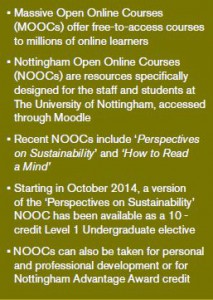
April 15, 2015, by Teaching at Nottingham
MOOCs & NOOCs: inspiring innovative approaches to teaching
“Nottingham has been involved in producing both MOOCs (online courses for external audiences) and NOOCs (online courses for an internal audience) since 2013, and there’s quite a bit of excitement about what’s happened in the first year and the direction we’re currently going in. I think over the past year we’ve been working out what their purpose is for us; I would say that both MOOCs and NOOCs are really about enhancement of teaching.”

“We now have six NOOCs and they are very much about engaging staff and students in online learning. We’re trying out a variety of approaches but all the time thinking about how online activities can really scaffold and support face-to-face learning. For example, I’m currently teaching an undergraduate module in the School of Education and I’m using Moodle and NOOC-style learning and the students are loving it, they’re really enjoying it…Using the online element more effectively can get the students doing their pre-session prep and their post-session reflection…so they’re doing their work in more bite-size chunks.”
“I’m getting them to do quite a variety of things – writing reflective blog posts, creating a visual history of the topic we’re covering, building a timeline – and it’s different for them. I’ve only got a small group, but you could use this approach with larger groups too, using Moodle to create smaller groups within a group, each focusing on a particular thing and then feeding back to the larger group within the face-to-face workshop. It spreads the load and helps them make the most of each other’s research.”
“One of the most important things is that, when you’ve got a group of students who don’t necessarily socialise much outside of the class, it means they are socialising online, responding and reacting to each other’s posts about the tasks they’ve been set…The ethos of online learning is that it has to be collaborative; to make it work effectively you have to encourage students to support each other…you have to get them talking to each other.”
“If you look at each of the NOOCs we offer, they may target different groups but the model we have at the moment is quite generic. In the next phase we’re saying ‘how can we start to customise it?’ Can we have a strand of generic learning and then areas more specifically for Business School students, for example, or Life Science students? It’s a versatile format and can be really supportive of the other things we’re doing…We’re trying to move our MOOCs and NOOCs beyond being the outputs of enthusiastic individuals to becoming School-supported activities and I think that the Teaching Transformation Programme can help with that.”
“The overall aim is to establish a portfolio of courses that act as a driver for teaching enhancement and provide a catalyst for staff, student and alumni engagement with online and blended learning.”
Dr Sarah Speight, School of Education
For further information on MOOCs and NOOCs, please follow this link.
No comments yet, fill out a comment to be the first

Leave a Reply